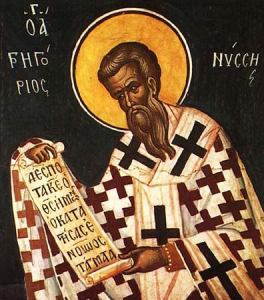“Sound the trumpet at the new moon,” says David, “even in the notable day of your feast” (Psalm 80:3).
The commandments of Divinely-inspired teaching are assuredly a law for those who hear them.
Therefore, since the notable day of our feast is at hand, let us, too, fulfill the law and become heralds of the solemnity.
The trumpet of the law, as the Apostle bids us understand, is the word.
[…] So let us produce a clear and audible sound, brethren, one that is no less noble than that of the trumpet.
For the Law, prefiguring the truth in the shadowy types, enjoined the sounding of the trumpet at the Feast of Tabernacles (cf. Leviticus 23:24).
Now, the theme of the present Feast is the mystery of the true Tabernacle.
For on this day did He Who vested Himself with humanity for our sake pitch His human tabernacle; on this day our tabernacles, which had disintegrated through death, are reconstituted by Him Who constructed our habitation from the very beginning.
Let us utter the words of the Psalm, joining in chorus with the loud-voiced David: “Blessed is he that cometh in the name of the Lord” (Psalm 117:26).
How does He come? He crosses over into human life, not by boat or by chariot, but through the incorruption of a Virgin.
This is our God, this is our Lord, Who appeared to us to ordain a Feast with thick branches, even unto the horns of the altar (Psalm 117:27).
We are assuredly not unaware, brethren, of the mystery contained in these words: that all of creation is a single temple of the Master of creation.
But since, when sin intervened, the mouths of those overcome by evil were stopped, the voice of rejoicing fell silent and the harmony of those who keep festival was interrupted, as human creation no longer celebrated with celestial Angel-kind, for this reason there came the trumpets of the Prophets and the Apostles, whom the Law calls horns, because they are formed from the true Unicorn (cf. Numbers 23:22).
By the power of the Spirit they made the word of truth resound with piercing clarity, so that the ears of those who had been made deaf by sin might be opened up and so that there might be one harmonious celebration, echoing in unison through the thick covering of the tabernacle of the lower creation with the sublime and preëminent Hosts that stand around the Heavenly Altar.
For the horns of the noetic Altar are the sublime and preëminent Powers of the noetic nature, the Principalities, Authorities, Thrones, and Dominions, to which human nature is joined by participation in the Feast through its resurrected tabernacle, which is “thickly covered” by the renewal of our bodies.
Gregory of Nyssa (c 335 – after 394): Homily on the Nativity of Christ (translation atHSIR from Patrologia Græca, Vol. XLVI, cols. 1128A-1149C).

